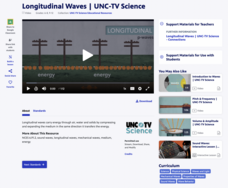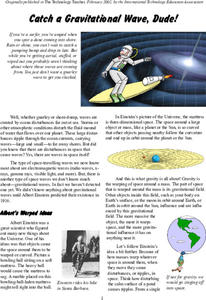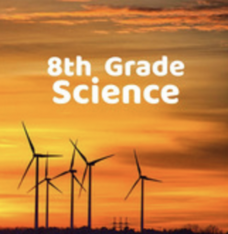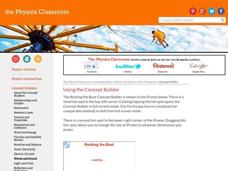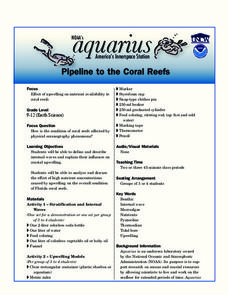California Department of Education
Slap Tubes, Flutes, and Xylophones: The Physics of Pipe-Based Instruments
It's the encore to a wave unit. Individuals build either a slap tube, flute, or xylophone as a culminating activity for a physics unit on waves. Scholars calculate the lengths of pipes needed to produce the specific notes for their...
California Department of Education
What Is a "Wave"?
Take a stretch, but don't wave goodbye. An interesting resource provides everything needed to present an introductory lesson plan on waves. Teachers present a PowerPoint defining the types of waves and their characteristics. Pupils use a...
NASA
Feel the Noise
Can you hear it now? Young scientists experiment with sound waves using metal objects and string. They strike metal objects while they hold them and as the objects hang from a string to compare the sound. They discover that sound travels...
PBS
Longitudinal Waves | UNC-TV Science
Discover whether sound travels in space and other fascinating science facts. Scientists explore energy transfer by longitudinal waves and learn about compression, rarefaction, amplitude, and wavelength while watching an animated video....
Exploratorium
A Splash of Color - Is Pure Water Colorless?
What makes the ocean blue but a glass of ocean water nearly colorless? Investigators prepare tubes of water to examine the color of water. Scholars discover the relationship between light absorption, color variations, and water depth as...
NASA
Catch a Gravitational Wave, Dude!
It is cowabunga time! Pupils read an article about the NASA LISA mission on gravitational waves and conduct additional research on them. The class participates in a science bowl type competition about gravitational waves. Panels of four...
CK-12 Foundation
CK-12 Earth Science Concepts for Middle School
Explore a variety of science concepts in an interactive textbook created for middle school scholars. A lengthy table of contents takes readers to pages comprised of a subject overview, outline, and summary. Follow links further to find...
Utah Education Network (UEN)
Utah Open Textbook: 8th Grade Science
The cycle of energy is important to many different systems on Earth. Scholars use questioning and observation to investigate the differences between renewable and non-renewable resources and how they relate to global changes. They...
Magic of Physics
Wave Machine
Three main factors determine the wave height experienced in the ocean. Scholars use a virtual simulator to alter wind speed, fetch, and duration. Each combination creates a unique wave measured in significant height.
PBS
Coastline Change
Continental drift happens over millions of years, but new perspective shows much faster changes. An informative resource offers a short term perspective using a series of satellite images. Viewers observe major changes to a coastline in...
Physics Classroom
Name That Harmonic: Closed-End air Columns
Physics is like music—practice makes perfect! Challenge your class using an interactive that builds harmonic skills. The engaging lesson from a playlist exploring sounds and waves revolves around wave behavior in closed-end air columns....
Physics Classroom
Rocking the Boat
Sometimes it's okay to rock the boat! Science scholars manipulate wave properties using a fun interactive. Part of a larger playlist that dives into waves and sound, the lesson helps users work their way from apprentice to wizard by...
Physics Classroom
Waves - Case Studies
What can your class tell about a wave just by looking at it? Using a simulation, physics pupils work through a series of case studies to determine the effects of speed, frequency, and density on waves. Part of a larger playlist on waves...
Physics Classroom
Wavelength
Physics class sure can have its ups and downs! The first in a series of seven interactives from the Waves and Sound series introduces young learners to the concept of wavelength. Scholars work through the interactive to discover the...
National Nanotechnology Infrastructure Network
Jell-O® Waveguide and Power Loss
Jell-O® can help model the transmission of light through fiber optic cables. Young scientists use the jiggly dessert to make a waveguide to transmit a laser beam from one point to another. Their models help them learn the function of...
Science 4 Inquiry
Battle of the Waves
Which travels faster, light or sound? Scholars work in groups to simulate the ability for waves to travel through solids, liquids, gases, and through a vacuum. Then, they learn about the properties of a mystery wave and must determine...
Cornell University
Sound Waves
How does sound travel through different mediums? Scholars explore this question by creating and observing sound waves as they learn the difference between transverse and longitudinal wave motion. Using their new knowledge, class members...
NOAA
A Day in the Life of an Ocean Explorer
What's life like aboard an ocean exploration vessel? Junior oceanographers examine the important role of communication in ocean research in lesson two of a five-part series from NOAA. The materials introduce the class to life on board...
NOAA
Energy from the Oceans
Can Earth's oceans produce a steady supply of clean energy? Scholars explore the uses of tidal and thermal energy in the 11th installment of a 13-part series about ocean-based alternative energy sources. Learners examine the current...
NOAA
Ocean Waves
Surf's up! What causes the constant motion of Earth's oceans? Scholars discover the origins and types of waves in part nine of a 13-installment series. The resource illustrates wave behavior, their destructive power, and current research...
University of Southern California
What Is The Ocean?
Go on a tour of the ocean through the lens of a scientist. Learners read maps of the ocean floor, study tide behavior, examine wave motion, and analyze components of soil. Each lesson incorporates a hands-on component.
Florida International University
Pipeline to the Coral Reefs
Discover firsthand the effects of internal waves on coral reefs. Through a series of experiments, learners simulate internal waves and upwelling events as they make observations on the movement of water and other debris. They then...
Columbus City Schools
Making Waves
Learning about waves can have its ups and downs, but a demo-packed tool kit has the class "standing" for more! Learners gain experience with several different wave types, organizing observations and data, and wave terminology. The...
CK-12 Foundation
Pan Flute
How can a pan flute sound one note while we hear a chord? The simulation explores sound waves, vibrations, and harmonics at the molecular level. Scholars control the pipe into which air is being blown, the length of the pipe, and which...





